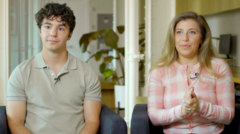**A coalition of over 400 prominent artists, including Sir Elton John and Dua Lipa, calls for updated copyright laws to shield their creative work from being exploited by AI technology without consent.**
**Celebrities Unite to Safeguard Their Work Against AI Encroachment**

**Celebrities Unite to Safeguard Their Work Against AI Encroachment**
**Musicians and artists urge UK government for stronger copyright protections amidst AI advancements.**
In a significant move, over 400 British musicians, writers, and artists—including industry luminaries like Sir Elton John and Dua Lipa—have petitioned Prime Minister Sir Keir Starmer for enhanced copyright protections against artificial intelligence (AI). These creatives have expressed concerns that without legal safeguards, they risk losing control of their original works to tech companies leveraging AI for content generation.
In a letter addressed to the Prime Minister, the signatories emphasize that failure to act could undermine not only their individual rights but also the UK's status as a global leader in creative industries. The artists are advocating for an amendment to the Data (Use and Access) Bill that would mandate AI developers to be transparent with copyright holders regarding the use of their materials in training AI models.
A spokesperson for the government outlined their commitment to fostering both the creative and tech sectors but assured that no changes will be implemented without thorough validation that they benefit creators. Notable figures like author Kazuo Ishiguro, playwright David Hare, and musicians Kate Bush and Robbie Williams have joined the call for reform, emphasizing the necessity of creative work in shaping the future of innovation.
Sir Paul McCartney has also raised concerns about the growing role of AI, suggesting that artists are vital to its development and sustainability. The artists are particularly calling for support of Baroness Beeban Kidron's amendment before a key House of Lords vote, arguing that it would establish a fair licensing framework that could protect human-created content against AI exploitation.
However, the proposal faces opposition from some, including Julia Willemyns of the Centre for British Progress, who warned that overly restrictive policies may hinder innovation and economic growth in the UK. She expressed skepticism about the amendment's ability to prevent foreign firms from leveraging British creativity without compensation.
The letter highlights a rising unease within the creative community regarding how generative AI systems incorporate copyrighted materials to generate new works. These AI tools, while innovative, have sparked criticisms over their data use practices and substantial energy consumption.
In response to industry pushback, the government has indicated a willingness to revisit their consultation surrounding AI development and copyright laws. Nobel laureate Ishiguro argued for a fairer licensing scheme that wouldn’t disadvantage individual creators in favor of large corporations.
As the debate on AI and copyright intensifies, Baroness Kidron advocates for transparency rules to encourage collaborative licensing arrangements between creators and tech developers, emphasizing the UK's potential role in the global AI market.
As discussions continue, the government has committed to releasing a comprehensive report that will explore the implications of the debate and potential policy paths.
In a letter addressed to the Prime Minister, the signatories emphasize that failure to act could undermine not only their individual rights but also the UK's status as a global leader in creative industries. The artists are advocating for an amendment to the Data (Use and Access) Bill that would mandate AI developers to be transparent with copyright holders regarding the use of their materials in training AI models.
A spokesperson for the government outlined their commitment to fostering both the creative and tech sectors but assured that no changes will be implemented without thorough validation that they benefit creators. Notable figures like author Kazuo Ishiguro, playwright David Hare, and musicians Kate Bush and Robbie Williams have joined the call for reform, emphasizing the necessity of creative work in shaping the future of innovation.
Sir Paul McCartney has also raised concerns about the growing role of AI, suggesting that artists are vital to its development and sustainability. The artists are particularly calling for support of Baroness Beeban Kidron's amendment before a key House of Lords vote, arguing that it would establish a fair licensing framework that could protect human-created content against AI exploitation.
However, the proposal faces opposition from some, including Julia Willemyns of the Centre for British Progress, who warned that overly restrictive policies may hinder innovation and economic growth in the UK. She expressed skepticism about the amendment's ability to prevent foreign firms from leveraging British creativity without compensation.
The letter highlights a rising unease within the creative community regarding how generative AI systems incorporate copyrighted materials to generate new works. These AI tools, while innovative, have sparked criticisms over their data use practices and substantial energy consumption.
In response to industry pushback, the government has indicated a willingness to revisit their consultation surrounding AI development and copyright laws. Nobel laureate Ishiguro argued for a fairer licensing scheme that wouldn’t disadvantage individual creators in favor of large corporations.
As the debate on AI and copyright intensifies, Baroness Kidron advocates for transparency rules to encourage collaborative licensing arrangements between creators and tech developers, emphasizing the UK's potential role in the global AI market.
As discussions continue, the government has committed to releasing a comprehensive report that will explore the implications of the debate and potential policy paths.






















